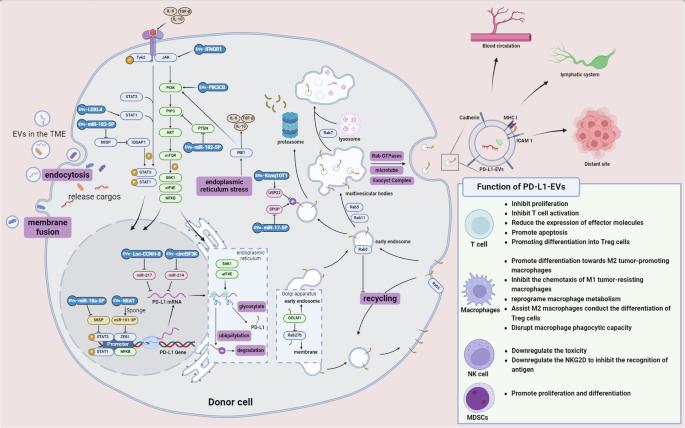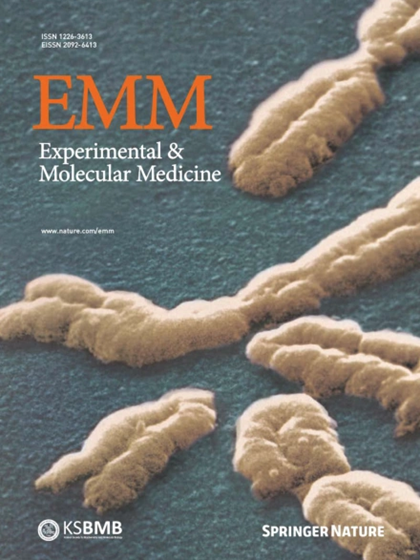Influencing immunity: role of extracellular vesicles in tumor immune checkpoint dynamics
IF 9.5
2区 医学
Q1 BIOCHEMISTRY & MOLECULAR BIOLOGY
引用次数: 0
Abstract
Immune checkpoint proteins (ICPs) serve as critical regulators of the immune system, ensuring protection against damage due to overly activated immune responses. However, within the tumor environment, excessive ICP activation weakens antitumor immunity. Despite the development of numerous immune checkpoint blockade (ICB) drugs in recent years, their broad application has been inhibited by uncertainties about their clinical efficacy. A thorough understanding of ICP regulation in the tumor microenvironment is essential for advancing the development of more effective and safer ICB therapies. Extracellular vesicles (EVs), which are pivotal mediators of cell–cell communication, have been extensively studied and found to play key roles in the functionality of ICPs. Nonetheless, a comprehensive review summarizing the current knowledge about the crosstalk between EVs and ICPs in the tumor environment is lacking. In this review, we summarize the interactions between EVs and several widely studied ICPs as well as their potential clinical implications, providing a theoretical basis for further investigation of EV-related ICB therapeutic approaches. In 1991, the finding of CTLA4 led to extensive studies on immune checkpoint proteins, key in controlling immune reactions. This review explores the role of extracellular vesicles—small particles released by cells carrying proteins, RNA, and lipids, affecting various cell functions—in immune checkpoint control. The research focuses on how EVs influence immune checkpoints, especially in cancer, where they can change immune cell function and affect therapy results. The authors aim to discover new treatment strategies by studying the interaction between EVs and immune checkpoints. This detailed review highlights the potential of targeting EV-related pathways to improve cancer treatment effectiveness and safety. The results emphasize the need for more research into EVs and immune checkpoints, potentially leading to significant progress in cancer treatment. This summary was initially drafted using artificial intelligence, then revised and fact-checked by the author.

影响免疫:细胞外囊泡在肿瘤免疫检查点动态中的作用。
免疫检查点蛋白(ICP)是免疫系统的关键调节因子,可确保免疫系统免受过度激活的免疫反应造成的损害。然而,在肿瘤环境中,ICP 的过度激活会削弱抗肿瘤免疫力。尽管近年来开发出了许多免疫检查点阻断(ICB)药物,但其临床疗效的不确定性阻碍了它们的广泛应用。要想开发出更有效、更安全的 ICB 疗法,全面了解肿瘤微环境中的 ICP 调节至关重要。细胞外囊泡(EVs)是细胞-细胞通讯的关键介质,已被广泛研究并发现在 ICPs 的功能中发挥着关键作用。然而,目前还缺乏一份全面的综述,总结目前关于肿瘤环境中 EVs 和 ICPs 之间相互影响的知识。在这篇综述中,我们总结了 EV 与几种广泛研究的 ICP 之间的相互作用及其潜在的临床意义,为进一步研究 EV 相关的 ICB 治疗方法提供了理论基础。
本文章由计算机程序翻译,如有差异,请以英文原文为准。
求助全文
约1分钟内获得全文
求助全文
来源期刊

Experimental and Molecular Medicine
医学-生化与分子生物学
CiteScore
19.50
自引率
0.80%
发文量
166
审稿时长
3 months
期刊介绍:
Experimental & Molecular Medicine (EMM) stands as Korea's pioneering biochemistry journal, established in 1964 and rejuvenated in 1996 as an Open Access, fully peer-reviewed international journal. Dedicated to advancing translational research and showcasing recent breakthroughs in the biomedical realm, EMM invites submissions encompassing genetic, molecular, and cellular studies of human physiology and diseases. Emphasizing the correlation between experimental and translational research and enhanced clinical benefits, the journal actively encourages contributions employing specific molecular tools. Welcoming studies that bridge basic discoveries with clinical relevance, alongside articles demonstrating clear in vivo significance and novelty, Experimental & Molecular Medicine proudly serves as an open-access, online-only repository of cutting-edge medical research.
 求助内容:
求助内容: 应助结果提醒方式:
应助结果提醒方式:


